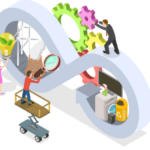Time is one of our most valuable resources, both in the workplace and in daily life. In professional settings, effective time management plays a crucial role in shaping individual performance and team success. Properly managing time allows employees to complete their daily tasks more efficiently, while poor time management can lead to a loss of motivation and disruptions in workflows. For this reason, cultivating time management as a habit is a fundamental step toward improving workplace productivity.
Understanding Time Management
Time management refers to utilizing available time in the most efficient way to complete tasks within set deadlines. This approach emphasizes prioritizing tasks correctly, transitioning effectively between responsibilities, and making smart use of time. Successfully managing time requires personal discipline and strong organizational skills. Raising awareness among team members about time management is essential in helping everyone make better use of their time.
Why Is Time Management Important for Teams?
The value of time in project management is universally acknowledged. Every project operates within a specific timeframe, and clients expect timely delivery. However, quality is just as critical—if the outcomes fall below expectations, meeting the deadline won’t matter to anyone.
Striking a balance between productivity and quality is therefore a critical skill. In other words, you need to learn how to use your time effectively without rigidly overplanning and maintain focus on ultimate goals. Team time management helps facilitate this process by ensuring all members are aligned toward the same objectives and fulfilling their responsibilities.
The Role of Time Management in Project Transparency
When deadlines, milestones, and tasks are clearly emphasized, time management techniques allow team members to gain a clear understanding of both their work and what others are contributing. This visibility helps identify why bottlenecks occur and which tasks need to be completed to reach the next milestone.
Time Management Minimizes Work Stress
Time Management: Ways to Enhance Team Performance
Now that we’ve explored the “why,” let’s shift our focus to the “how” of putting time management strategies into action and boosting team performance.
First and foremost, it’s essential to understand that managing time for a team is not the same as managing it individually. While some tips may apply to personal use, this list is specifically tailored for team-based time management, which requires a more intricate approach.
Understand Your Current Situation by Tracking Time
Before you can effectively manage time, it’s crucial to learn how to track and analyze it. Utilizing time tracking tools provides valuable insights into how team members allocate their work hours across different tasks. Managers can use this data to make more informed decisions and stay aligned with their objectives.
Example: Your marketing team spends 10 hours a week addressing customer inquiries on social media, yet only 5% of leads are generated from this channel. Time tracking data indicates that reducing resources in this area and focusing on higher-performing channels could lead to better outcomes.
Set Clear and Measurable Goals
Successful time management starts with a clear understanding. Team members must have a solid grasp of the purpose behind each task and the deadlines set for every milestone.
When team members clearly understand their individual goals, they can easily:
- Allocate sufficient time for their tasks
- Plan future responsibilities effectively
- Evaluate their own progress
Managers should oversee task completion, but this doesn’t mean they need to be overly involved. Sharing team goals openly is a practical solution to ensure everyone can track project progress, reducing the need for frequent status updates from managers.
Establish Guidelines for Effective Time Management
Time management isn’t a process imposed from the top; it’s a shared responsibility. Every team member should manage their time effectively, and clear guidelines can help them achieve this goal.
It’s advisable to create time management rules before forming project teams. These rules can include advice on setting realistic deadlines, utilizing calendar tools, and adopting techniques like time blocking or the Pomodoro method.
However, it’s essential to maintain a balanced approach. Employees are not machines to extract maximum productivity from—they require moments to recharge during intense work sessions. That said, setting clear expectations regarding how much personal time or social media use is acceptable during paid working hours can contribute to a more productive environment.
Help Your Team Focus on Prioritizing Key Tasks
Team members sometimes find themselves bogged down by minor duties, overlooking tasks that are crucial to project success. The key is identifying which tasks truly matter and drive progress toward the team’s goals.
Effective time management strategies can guide team members in allocating their time more wisely. A particularly effective method is the Eisenhower Matrix, which streamlines task prioritization and works in almost any context.
The Eisenhower Matrix operates on two axes: one categorizes tasks as “urgent” or “non-urgent,” while the other distinguishes between “important” and “unimportant” tasks. You can likely already see how this tool helps clarify where team efforts should be directed.
Foster a Culture of Declining Non-Urgent Tasks
One of the key benefits of the Eisenhower Matrix is its ability to empower team members to make informed decisions about their workload.
By prioritizing effectively, team members can push non-urgent tasks to the back of the line or even discuss with managers why these tasks might not need immediate attention. This helps them stay focused on critical objectives rather than being distracted by less important tasks.
Creating this sense of empowerment requires a supportive work environment that encourages open communication and builds confidence. Here are some ways to nurture such a culture:
- Respond positively when team members decline tasks. Take the time to understand their reasoning and discuss their current responsibilities.
- Use feedback from these conversations to refine your delegation approach. It’s possible that too many minor tasks are being assigned before core project goals are addressed.
- During team meetings, reassure colleagues that it’s acceptable to decline tasks and emphasize the importance of self-management in maintaining focus and productivity.
Equip Employees with Effective Collaboration Tools
While many time management strategies emphasize individual productivity, successful self-organization depends on having the right tools in place. Collaboration tools are essential for creating the infrastructure needed for efficient teamwork.
Platforms like Notion or Slack facilitate seamless communication and encourage the free exchange of ideas. These tools allow team members to track progress in real-time, provide support to one another, and identify tasks that need immediate attention.
Visualize Workloads with the Right Tools
To fully implement time management strategies, teams also need tools that offer visual representations of workloads. Collaboration platforms with built-in workload views help teams see schedules and tasks at a glance. Managers can monitor task distribution, ensuring no one is overburdened and tasks are efficiently balanced across the team.
Encourage Regular Breaks and Flexible Work Styles
This might sound counterintuitive, but allowing employees more flexibility with their schedules and time off can actually enhance time management.
How does that work? Over-focusing on a single task can cause employees to lose sight of the bigger picture. They may neglect to plan their day effectively or set achievable goals, leading to stress and potential burnout.
Encouraging regular breaks and flexible work hours provides employees with opportunities to recharge and reflect. This can lead to fresh insights for handling time-consuming tasks and enable workers to return to their responsibilities with renewed focus and energy.
Provide Training to Strengthen Time Management Skills
Time management, like any professional skill, requires dedicated training and consistent practice.
Scheduling team workshops on time management annually or at the beginning of new projects can make a significant impact. Sessions on techniques such as the Eisenhower Matrix or time blocking can yield substantial benefits as projects move forward.
Additionally, organizing one-on-one meetings between managers and team members is crucial for identifying personal challenges. Each individual faces unique distractions and time demands. For some, it might be the overload of meetings, while others may need flexibility to balance family responsibilities or external commitments. These conversations help craft personalized strategies for each team member.
No matter which approach you take, focus on fostering key time management skills, including:
- Prioritization: Teaching employees how to use tools like the Eisenhower Matrix to determine which tasks require immediate attention.
- Goal Setting: Helping staff set realistic and achievable objectives instead of randomly working through a long to-do list.
- Avoiding Multitasking: Emphasizing the importance of concentrating on one task at a time for better efficiency.
- Setting Boundaries: Guiding team members on how to balance work and personal obligations effectively.
- Collaboration: Encouraging employees to share tasks when appropriate to maximize the team’s overall potential
Simplify Time Management with Perwatch
At Perwatch, we understand how crucial time management is for teams. When time gets out of control, stress levels rise, and team productivity takes a hit. That’s why we’ve developed a time tracking and productivity tool to help teams make the most of every minute.
With Perwatch, you can easily manage employee schedules and set individual goals. Our advanced reporting features help identify potential bottlenecks and areas for improvement. After all, it’s much harder to waste time when you have all your team’s data at your fingertips







